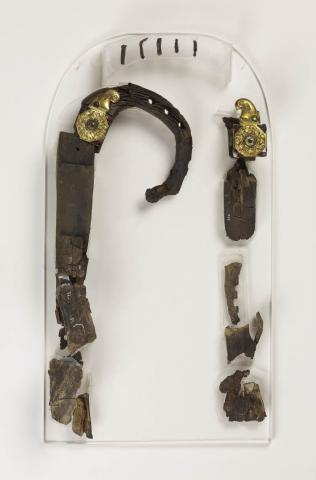<Quod in monastēriō eius fuerit frāter, cui dōnum canendī sit dīvīnitus concessum>
[1] In huius monastēriō abbātissae fuit frāter quīdam dīvīnā grātiā speciāliter īnsignis, quia carmina religiōnī et pietātī apta facere solēbat, ita ut, quicquid ex dīvīnīs litterīs per interpretēs disceret, hoc ipse post pusillum verbīs poēticīs maxima suāvitāte et compūnctiōne compositīs in suā, id est Anglōrum, linguā prōferret. [2] Cuius carminibus multōrum saepe animī ad contemptum saeculī et appetītum sunt vītae caelestis accēnsī. [3] Et quidem et aliī post illum in gente Anglōrum religiōsa poēmata facere temtābant, sed nūllus eum aequiparāre potuit. [4] Namque ipse nōn ab hominibus neque per hominem īnstitūtus canendī artem didicit, sed dīvīnitus adiūtus grātīs canendī dōnum accēpit. [5] Unde nīl umquam frīvolī et supervacuī poēmatis facere potuit, sed ea tantummodo quae ad religiōnem pertinent religiōsam eius linguam decēbant. [6] Siquidem in habitū saeculārī usque ad tempora prōvectiōris aetātis cōnstitūtus, nīl carminum aliquandō didicerat. [7] Unde nōnnumquam in convīviō, cum esset laetitiae causā dēcrētum ut omnēs per ōrdinem cantāre dēbērent, ille, ubi adpropinquāre sibi citharam cernēbat, surgēbat ā mediā cēnā et ēgressus ad suam domum repedābat.
[8] Quod dum tempore quōdam faceret, et relictā domū convīviī ēgressus esset ad stabula iūmentōrum, quōrum eī cūstōdia nocte illā erat dēlēgāta, ibique hōrā competentī membra dedisset sopōrī, adstitit eī quīdam per somnium, eumque salūtāns ac suō appellāns nōmine: ‘Caedmōn,’ inquit, ‘cantā mihi aliquid.’ [9] At ille respondēns: ‘Nesciō,’ inquit, ‘cantāre; nam et ideō dē convīviō ēgressus hūc sēcessī, quia cantāre nōn poteram.’ [10] Rūrsum ille quī cum eō loquēbātur, ‘Attamen,’ ait, ‘mihi cantāre habēs.’ [11] ‘Quid,’ inquit, ‘dēbeō cantāre?’ [12] Et ille, ‘Canta,’ inquit, ‘prīncipium creātūrārum.’ [13] Quō acceptō respōnsō statim ipse coepit cantāre in laudem Deī conditōris versūs quōs numquam audierat, quōrum iste est sēnsūs: ‘Nunc laudāre dēbēmus auctōrem rēgnī caelestis, potentiam creātōris et cōnsilium illīus, facta patris glōriae. [14] Quōmodo ille, cum sit aeternus Deus, omnium mīrāculōrum auctor extitit, quī prīmō fīliīs hominum caelum prō culmine tēctī, dehinc terram cūstōs hūmānī generis omnipotēns creāvit.’ [15] Hic est sēnsūs, nōn autem ōrdō ipse verbōrum, quae dormiēns ille canēbat; neque enim possunt carmina, quamvīs optimē composita, ex aliā in aliam linguam ad verbum sine dētrīmentō suī decōris ac dignitātis trānsferrī. [16] Exsurgēns autem ā somnō, cūncta quae dormiēns cantāverat memoriter retinuit, et eīs mox plūra in eundem modum verba Deō dignī carminis adiūnxit.
[17] Veniēnsque māne ad vīlicum quī sibi praeerat, quid dōnī percēpisset indicāvit, atque ad abbātissam perductus iussus est, multīs doctiōribus virīs praesentibus, indicāre somnium et dīcere carmen, ut universōrum iūdiciō quid vel unde esset quod referēbat probārētur. [18] Vīsumque est omnibus caelestem eī ā Dominō concessam esse grātiam. [19] Expōnēbantque illī quendam sacrae historiae sīve doctrīnae sermōnem, praecipientēs eum, sī posset, hunc in modulātiōnem carminis trānsferre. [20] At ille susceptō negōtiō abiit, et māne rediēns optimō carmine quod iubēbātur compositum reddidit. [21] Vnde mox abbātissa amplexāta grātiam Deī in virō, saeculārem illum habitum relinquere et monachicum suscipere prōpositum docuit; susceptumque in monastērium cum omnibus suīs frātrum cohortī adsociāvit iussitque illum seriem sacrae historiae docērī.
[22] At ipse cūncta quae audiendō discere poterat, rememorandō sēcum et quasi mundum animal rūminandō in carmen dulcissimum convertēbat, suāviusque resonandō doctōrēs suōs vicissim audītōrēs suī faciēbat. [23] Canēbat autem dē creātiōne mundī et orīgine hūmānī generis et tōtā Genesis historiā, dē ēgressū Israel ex Aegyptō et ingressū in terram reprōmissiōnis, dē aliīs plūrimīs sacrae scrīptūrae historiīs, dē incarnātiōne dominicā, passiōne, resurrēctiōne, et ascēnsiōne in caelum, dē spiritūs sānctī adventū et apostolōrum doctrīnā. [24] Item dē terrōre futūrī iūdiciī et horrōre poenae gehennālis ac dulcēdine rēgnī caelestis multa carmina faciēbat, sed et alia perplūra dē beneficiīs et iūdiciīs dīvīnīs in quibus cūnctīs hominēs ab amōre scelerum abstrahere ad dīlēctiōnem vērō et sōllertiam bonae āctiōnis excitāre cūrābat. [25] Erat enim vir multum religiōsus et rēgulāribus disciplīnīs humiliter subditus; adversum vērō illōs quī aliter facere volēbant zēlō magnī fervōris accēnsus; unde et pulchrō vītam suam fīne conclūsit.
[26] Nam propinquante hōrā suī dēcessūs, XIIII diēbus praeveniente corporeā īnfirmitāte pressus est, adeō tamen moderātē ut et loquī tōtō eō tempore posset et ingredī. [27] Erat autem in proximō casa in quā īnfirmiōrēs et quī prope moriturī esse vidēbantur indūcī solēbant. [28] Rogāvit ergō ministrum suum vesperē incumbente, nocte quā dē saeculō erat exitūrus, ut in eā sibi locum quiēscendī praeparāret; quī mīrātus cūr hoc rogāret, quī nēquāquam adhūc moritūrus esse vidēbātur, fēcit tamen quod dīxerat. [29] Cumque, ibīdem positī, vicissim aliquā gaudente animō ūna cum eīs quī ibīdem ante inerant loquerentur ac iocārentur, et iam mediae noctis tempus esset trānscēnsum, interrogāvit sī eucharistiam intus habērent. [30] Respondēbant: ‘Quid opus est eucharistiā? Neque enim mōrī adhūc habēs quī tam hilariter nōbīscum velut sospes loqueris.’ [31] Rūrsus ille: ‘Et tamen,’ ait, ‘afferte mihi eucharistiam.’ [32] Quā acceptā in manū interrogāvit sī omnēs placidum ergā sē animum et sine querēlā contrōversiae ac rancōris habērent. [33] Respondēbant omnēs placidissimam sē mentem ad illum et ab omnī īrā remōtam habēre, eumque vicissim rogābant placidam ergā ipsōs mentem habēre. [34] Quī cōnfestim respondit: ‘Placidam ego mentem, fīliolī, ergā omnēs Deī famulōs gerō.’ [35] Sīcque sē caelestī mūniēns viāticō vītae alterīus ingressuī parāvit; et interrogāvit quam prope esset hōra quā frātrēs ad dīcendās Dominō laudēs nocturnās excitārī dēbērent. [36] Respondēbant: ‘Nōn longē est.’ [37] At ille: ‘Bene, ergō exspectēmus hōram illam.’ [38] Et signāns sē signō sānctae crucis reclīnāvit caput ad cervical, modīcumque obdormiēns ita cum silentiō vītam fīnīvit. [39] Sīcque factum est ut, quōmodo simplicī ac pūrā mente tranquillāque dēvōtiōne Dominō servierat, ita etiam tranquillā morte mundum relinquēns ad eius vīsiōnem venīret, illaque lingua, quae tot salūtāria verba in laudem conditōris composuerat, ultima quoque verba in laudem ipsīus, signandō sēsē et spīritum suum in manūs eius commendandō, clauderet; quī etiam praescius suī obitūs extitisse ex hīs quae nārrāvimus vidētur.


